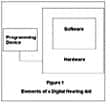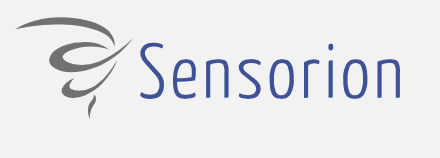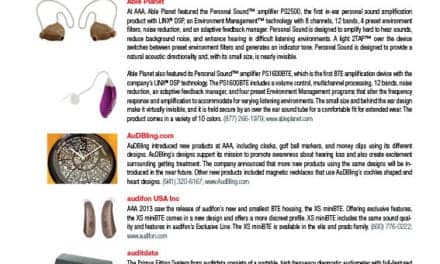Responding to one of the worst US natural disasters in living memory, and the largest dislocation of the US population since the Great Depression, hearing health care professionals and the hearing industry rallied to help those affected on the Gulf Coast by Hurricane Katrina. (Editor’s Note: Most hearing instrument manufacturers, as well as professional organizations and many dispensing offices, offered assistance following the hurricane. In this light, the following is only a representative sampling of aid provided by hearing-related concerns.)
Hearing Instrument and Cochlear Implant Manufacturers. In a joint effort, Starkey Laboratories and the Starkey Hearing Foundation announced that they are providing $40 million in hurricane relief efforts. Starkey, the largest American-headquartered hearing aid company, has pledged $25 million for its Help America Hear Project, a business recovery program designed to help with employment, new business plans, and office relocation for dispensing professionals and hurricane victims. In addition, the Starkey Hearing Foundation has committed $15 million in hearing care services through expansion of its domestic Hear Now program, which will provide hearing instruments for the victims of Hurricane Katrina.
“Our thoughts and prayers go out to the thousands of people affected by the disaster,” says Starkey President Jerry Ruzicka. “Starkey is honored to lend support to area residents and hearing professionals displaced by the hurricane.” Starkey has already provided funds and necessary equipment to help hearing care professionals with recovery efforts. “We want to do our part to help professionals in our industry provide their patients with the immediate care they need,” says Ruzicka.

The Starkey Hearing Foundation, which annually provides thousands of free hearing instruments to impoverished people throughout the world, is also mobilizing to provide much-needed hearing care to victims who were relocated to Texas and other parts of the region. Founder William F. Austin is spearheading the organization’s efforts. “We intend to provide as much care as necessary to help families begin their recovery processes,” says Austin. He and a team of eight others were in Houston from September 9-11 to work with hurricane victims who had hearing needs. They took hundreds of impressions at the George R. Brown Convention Center, carried them to Starkey Labs in Minneapolis, and flew back 48 hours later to deliver the devices.
Oticon Inc established a matching-funds program among employees for donations to the hurricane relief effort, as well as a system that matches funds of dispensing professionals and their patients. “We’ve always considered the hearing care field a ‘helping people’ field in which we consider the people’s needs on a daily basis,” says Oticon President Peer Lauritsen. “Every time you turn on the television, it’s difficult not to feel for the people affected by Hurricane Katrina.” He explains that Oticon has contributed to the relief effort in three ways. First, it has an employee contribution and matching system. “Every dollar that employees contribute to the Red Cross, Oticon matches it. Second, Oticon matches contributions up to $100 made by all our customers until October 15. And, third, regardless of individual contributions, we will contribute $1 for every hearing aid ordered between now and October 15.” Proceeds will go to the American Red Cross fund to aid hurricane victims in Louisiana, Alabama, and Mississippi. Offices will receive Katrina Relief stickers for the contributions.
Phonak US, in light of the tragedies surrounding Katrina and its aftermath, set aside funds to establish a hearing aid bank specifically for victims of the hurricane who have lost their hearing aids and are unable to replace them. Phonak says it will partner with any practitioner in the Southeastern US to provide hearing aids at no cost to qualified patients. Dispensing professionals who are interested in additional information on the program can contact Phonak Vice President of Professional Relations and Education Dave Fabry at [email protected].
Cochlear Americas is donating batteries for cochlear implant sound processors, and is matching donations made by its employees and customers to organizations assisting hurricane survivors. “To people who wear hearing aids or cochlear implants,” says Cochlear Americas President Chris Smith, “being without batteries is like being cut off from the world.”

Likewise, Boston Scientific Corp, owner of Advanced Bionics, announced that it is donating $500,000 to the American Red Cross Disaster Relief Fund. Advanced Bionics also assisted in temporary power assistance of cochlear implant users via car chargers and replacement charging units. “Our thoughts and prayers go out to all those who have been impacted by this catastrophic storm,” says Boston Scientific President Jim Tobin. “We hope our donation brings some measure of relief to the people of the Gulf Coast whose lives have been ravaged by this terrible disaster.”
Professional and Consumer Organizations. The American Academy of Audiology (AAA) is working in conjunction with Self Help for Hard of Hearing People (SHHH) and the Texas Academy of Audiology, helping those affected by the hurricane by setting up mobile units in a number of Texas cities. AAA will post a list of those audiologists on its Web site (www.audiologist.org) “…so that over the next weeks and months, hurricane survivors throughout the country will be able to access audiology services that they may need,” says AAA President Gail Whitelaw. “The expectation is that these services would be offered as free of charge to those hurricane survivors seeking services, including fitting of donated hearing instruments.”
The American Speech Language Association (ASHA) has established a Web site (www.asha.org/katrina) for the purpose of offering a number of different services via one online resource. The service extends to academic programs, as well as member-to-member exchanges.
SHHH is responding to the disaster by establishing the hear2care project. Coordinating with SHHH members who are volunteering, corporate partners, and hearing health care professionals, SHHH’s first focus is on those refugees who need help in Texas. The organization says they will be helping people who rely on hearing aids or cochlear implants for their communication needs, or who need some type of hearing assistance technology. The program is designed to provide batteries to those who have hearing aids and cochlear implants, to facilitate emergency hearing aid repair, and to provide personal hearing assistive devices to those who have a significant hearing loss, but who do not have a hearing aid. For more information on the program, visit www.shhh.org/hear2care/html/about_hear2care.html or call (301) 657-2248.
Universities. Louisiana School for the Deaf (LSD) in Baton Rouge reported that its campus and facilities came through the hurricane unscathed, and their focus following the disaster was to locate students and try to get them back into school, including students and families throughout Louisiana, as well as in Florida, Tennessee, Arkansas and Texas. LSD Superintendent Bill Prickett says that local service providers include the Louisiana Commission for the Deaf, Louisiana Association of the Deaf, Louisiana Career Development Center, Catholic Deaf Center, First Baptist Deaf Church, Assembly of God Deaf Church, and Louisiana School for the Deaf, which are coordinating services for deaf refugees. The Baton Rouge Deaf Action Center is also conducting screenings and connecting deaf refugees with food stamp programs, unemployment, social security, FEMA, counseling and comforting. The organization is also providing interpreters, while LSD is providing temporary housing, food and clothing until the refugees can be relocated with friends or relatives.
Gallaudet University, Washington, DC, has offered educational assistance to deaf and hard of hearing undergraduate and graduate students attending colleges or universities closed due to Hurricane Katrina, and is offering that the students may enroll either on a visiting student basis or as a full-time transfer student to Gallaudet (the offer also applies to deaf and hard of hearing students displaced from elementary or secondary schools). The University reports that it is working with the LSD and the Mississippi School for the Deaf to help deaf community members displaced by the storm find food and shelter. See the university’s Web site at www.galludet.edu.
Individual efforts. Scores of individual dispensing offices—ranging from Dallas to Minneapolis, from New York City to Los Angeles—have offered their services to hearing-impaired people who have been dislocated by the hurricane. Additionally, many professionals in the affected areas of Louisiana, Mississippi, Texas, and Florida have joined with various organizations in providing hearing help via mobile vans and at dispensing practices/offices.




